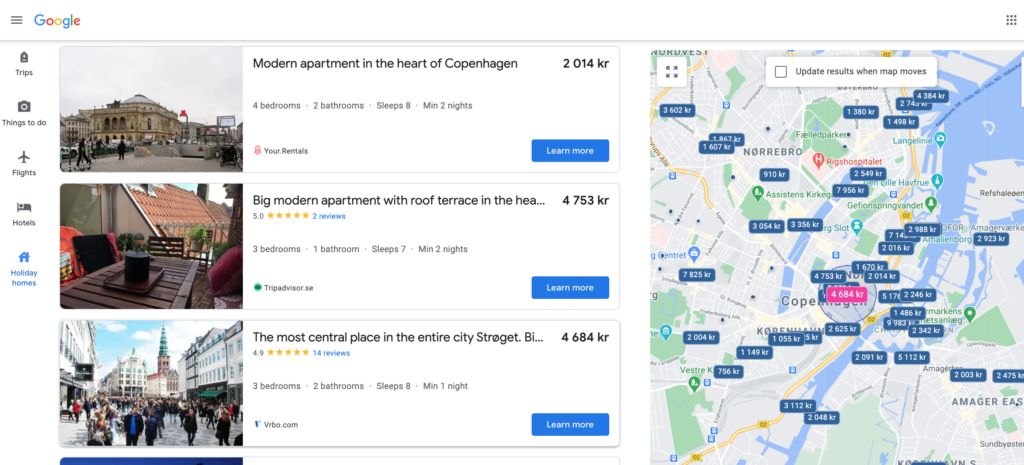Early in 2019, Google launched Google Vacation rentals.Google Flight, Google Hotel, and then Google Vacation rentals.Since then, Google has teamed with major online travel agencies (OTAs) like Vrbo and TripAdvisor as well as key metasearch platforms like HomeToGo to display their vacation rentals on this new platform. Booking.com, the industry leader in online travel, has also joined Google Vacation Rentals.
Google is undoubtedly building a one-stop store for travellers. From finding ideas for their next dream vacation to making reservations online.Customers can now access all the information they require from Google.This one-stop-shop experience will definitely change travellers’ habits in searching and looking for travel ideas and products. As a vacation rental manager, what does it mean for you? And, maybe more importantly, how can you list your vacation rentals on Google?
Well you’re at the right place; In this article, we will explore all these questions and help you to build a sound channel and marketing strategy for your Google vacation rental listings in the long run.
What is Google Vacation rentals?
In 2018 Google redesigned their mobile and desktop hotel search experiences included the vacation rentals in the hotel search results. Later on in March 2019, Google introduced a new filter “vacation rentals” to make the vacation rental search much easier. Then in 2020, Google launched “Vacation rentals” as a stand-alone product alongside “Trips”, “Explore” “Things to do”, “Flights”, and “Hotels”.
Both mobile and desktop devices are compatible with Google Vacation rentals. The results can be sorted by lowest pricing or highest ratings when the traveller chooses their destination and the date. Additionally, there are filters by amenities and filters by the number of bedrooms and/or bathrooms that help travellers focus their search. Additionally, users may view rates and availability of the vacation rental property as well as explore images and read reviews.
The user experience is similar to that of any OTA, with the exception that when customers choose to book a particular rental and click “Book Now” or “Learn more,” they are transferred to the partner website to finalise the booking and make payment.
Who can list on Google Vacation rentals?
Currently, it’s not possible to list your properties directly on Google Vacation rentals. Instead, you must make use of a Google-connected partner website or channel manager. Several partners, including Expedia, Vrbo, Hotels.com, RedAwning, HolidayLettings, TripAdvisor, and other rental channels, collaborate with Google Vacation Rentals. Additionally linked to Google’s vacation rental platform are Booking.com and Agoda.
It’s odd that Airbnb hasn’t added it’s vacation rentals to Google (yet). However, Airbnb is succeeding greatly by employing its own marketing approach. Your vacation rentals should already be listed on Google Vacation rentals if you have listings on those OTAs.
Utilizing a channel manager has several benefits, including making it simple to manage your properties across various channels and synchronise the calendars to prevent double reservations.
What if you have your own vacation rental website? Google my business for Vacation rental professionals
You might also think about using Google My Business if you have a company address and your own website for vacation rentals. Businesses and organisations can manage their online presence across Google, including Search and Maps, with the help of Google My Business, a free and simple-to-use service. You shouldn’t pass up this chance because local search is a crucial component of an all-encompassing marketing plan.
However, you may note that Google My Business also indicates businesses that are not eligible for the platform. One of the businesses not eligible includes “rental or for-sale properties such as vacation homes, model homes, or vacant apartments. Sales or leasing offices, however, are eligible for verification”.
However, we find various responses when we visit the Google My Business community. There are certain property managers who can display their holiday rentals on a website, but not all of them.
Regardless of whether you consider advertising your vacation rentals on Google My Business by providing a link to your company’s website and registered address, you should still make your website SEO-friendly and searchable.
What if you do not have a website but you are considering having one?
The goal of building a website is to increase direct bookings in addition to visibility and branding. Consequently, you may avoid paying the channel commission, keep the majority of the booking revenue, and interact directly with your visitors. Despite this, you shouldn’t entirely replace OTA channels with your own website.
One major takeaway is that your website should be a bookable website. That means it should have a booking widget or booking engine that synchronises with your calendar to show guests what is available and what is not. It should also have the payment and transaction function to ensure you secure the booking and payment.
Conclusion
Vacation rental operators should diversify their marketing and channel strategies in light of the growing popularity of Google Vacation rentals and Google’s desire to develop a one-stop-shop experience under Google Trips. On the one hand, your vacation rentals should connect to a channel manager so you may offer them on Google Vacation rentals. To encourage direct bookings, you should also have a website that is bookable. By doing this, you will have a comprehensive marketing plan and channel for your vacation rentals, which will make it simple for you to expand your business.
For more details contact info@vafion.com
Follow us on Social media : Twitter | Facebook | Instagram | Linkedin
Similar Posts:
- No similar blogs



